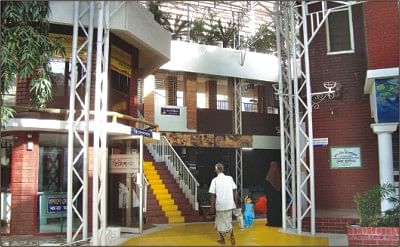Akij Group quickens CSR efforts

A man walks to Ad-din Hospital in Dhaka. The hospital, a philanthropic venture of corporate giant Akij Group, is poised for expansion to provide low-cost medical services to the poor. Photo: Sajjadur Rahman
Akij Group has sped up its corporate philanthropic efforts by expanding Ad-din Hospital to provide "low-cost, yet standard" health services to the growing urban population.
The corporate giant that has three hospitals in operation will set up three more outlets this year: two in Dhaka and a third in Khulna, hospital officials said yesterday.
The hospital's Dhaka unit, founded in late 1997, provided outdoor treatment to 7.19 lakh patients in 2008, a 20 percent rise from 5.99 lakh patients treated in 2007.
Akij is one of the country's largest business conglomerates and has diversified businesses ranging from biri (traditional cigarettes) to IT software and manufacturing of goods.
To encourage private companies into CSR efforts, the government had earlier approved tax exemption facility at the rate of 10 percent on part of the corporate income to be spent as CSR.
In line with the tax exemption, economic, environmental and social development activities will be brought within CSR purview.
According to statistics by Ad-din, the hospital handles more than 8,000 delivery cases a year, a trend that has continued over the past four years.
“The management will open two hospitals of the same standards in Mirpur and Postogola in Dhaka this year to provide low-cost health services to the poor,” Shahjalal Farazi, office secretary of Ad-din, told The Daily Star. Ad-din will start its operations in Khulna shortly.
“We also provide ambulance services at low costs -- between Tk 60 and Tk 160 in Dhaka,” Farazi said.
The late Akij Group founder Sheikh Akij Uddin set up the first branch of Ad-din in 1980, in his home district in Jessore as part of the group's corporate social responsibility (CSR).
Later, he had founded another hospital in Kushtia and the latest in Dhaka in 1997.
The hospital had initially treated only women and children. Services for male patients are also being treated in the philanthropic outreach.
According to officials, Ad-din in Dhaka is facing increasing pressure from patients because of its low-cost services, compared with other hospitals in the city.
“A Caesarean costs only Tk 6,400. Medicines are also provided in our hospital. The total services cost no less than Tk 30,000 in any other hospital in the city,” said Rokeya Khatun, a doctor for the hospital.
Currently, the hospital deals with 30 deliveries and treats 1,200 outpatients a day on average. A doctor's visiting charges per patient cost Tk 50. The patient also gets a card from the hospital. Follow-up visits will not require additional spending.
MIS officer MA Monsur said the hospital treated only 16,000 patients at its outdoor facility in Dhaka in 1998. The number reached nearly five lakh in 2005. The number again rose to nearly six lakh in 2007, and crossed the seven lakh mark in 2008.
The hospital has 350 beds, of which 180 are totally cost-free. It has about 650 staffers: 50 consultants, 40 medical officers and over 200 nurses.
“Operational costs are met by the income of the hospital, but the management has to inject about Tk 50 lakh every three months to subsidise treatment for the poor,” Farazi said.
Akij Group's annual turnover is around Tk 3,500 crore, according to officials. Dhaka Tobacco, a concern of the group, has an annual turnover of Tk 2,200 crore. The tobacco company has a dominant market in the country's low-cost cigarettes sector.

 For all latest news, follow The Daily Star's Google News channel.
For all latest news, follow The Daily Star's Google News channel. 



Comments